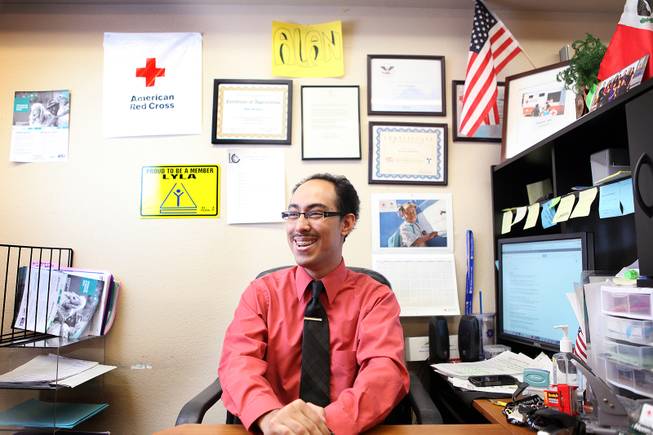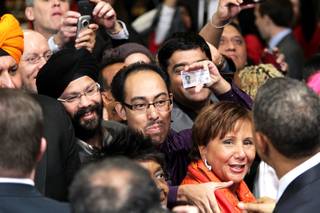
Las Vegas resident Alan Aleman, 20, at his desk at Hermandad Mexicana in Las Vegas on Thursday, February 7, 2013. Aleman, who was brought illegally to the United States by his parents when he was 11, was one of the first Las Vegas residents to get his Deferred Action for Childhood Arrivals (DACA) work permit.
Sunday, Feb. 10, 2013 | 2 a.m.
In the excitement of the moment Alan Aleman did not capture all of the little details, and he struggles to recall them now.
President Barack Obama was at Las Vegas’ Del Sol High School on Jan. 29 to deliver a speech on immigration reform, and he held up Aleman as an example of just the kind of immigrant that deserves a chance to make a life in the United States. Thinking about it a little more than a week later, Aleman blushes with excitement and his smile reaches wide, flashing two rows of braces.
He can’t remember exactly what he said to the president when they met briefly and shook hands after the speech, or what the president said back to him, but it was special nonetheless. Aleman, a 20 year-old student at College of Southern Nevada who crossed the border illegally from Mexico with his parents when he was 11 years old, said he was honored by Obama’s recognition.
Concluding his speech, the president talked generally of the nation’s debt to immigrants. Wave after wave of immigrants, the president pointed out, made this country what it is and contributed to its prosperity.
“They all came here knowing that what makes somebody an American is not just blood or birth, but allegiance to our founding principles and the faith in the idea that anyone from anywhere can write the next great chapter of our story,” Obama said. “And that’s still true today. Just ask Alan Aleman.”
Obama announced the Deferred Action for Childhood Arrivals program, which grants work permits to young immigrants who meet certain criteria, in June. Two months later, on the first day applications were accepted, Aleman applied. In October, he received his work permit and subsequently received his Social Security number and a driver’s license.
According to U.S. Citizenship and Immigration Services, there have been 407,899 deferred action applications submitted through Jan. 17, and 154,404 have been approved.
After Aleman completes his studies at CSN, he plans to transfer to UNLV or UNR and eventually study medicine and join the Air Force. He works six days a week at Hermandad Mexicana, a nonprofit organization offering legal and immigration assistance. When he is not working or in school, he serves on the Latin Chamber of Commerce board of directors and Southern Nevada Red Cross board of directors.
“So in the coming weeks, as the idea of reform becomes more real and the debate becomes more heated, and there are folks who are trying to pull this thing apart, remember Alan and all those who share the same hopes and the same dreams,” Obama told the crowd. “Remember that this is not just a debate about policy. It’s about people. It’s about men and women and young people who want nothing more than the chance to earn their way into the American story.”
The Sun caught up with Aleman to discuss the speech and how his life has changed since receiving his work permit.
What was your life like before receiving your work permit?
I always knew that I was undocumented, but you start to see the consequences more when you are in high school. You don’t have the opportunity to apply for scholarships. You don’t have your driver’s license.
I went to Southeast Career and Technical Academy, and I went there because they had a medical program -- health occupations or something like that. So in my sophomore year they said in order to enroll in health occupations you need your Social Security number. So, that’s why I ended up in the business program. I had to move from health occupations to office technology, because they were asking me for my Social Security number.
You were worried about being discovered before receiving the work permit, but you still participated in community organizations. Were you worried about revealing yourself?
I never saw my immigration status as being a barrier or something to stop me from helping my community. In high school I was in SOL, the Student Organization of Latinos, and I have always liked to be involved in the community.
Some young immigrants have admitted to not being legal residents as they advocate for change, but you chose not to, why?
I never spoke about being undocumented until I got my work permit. Only my close friends knew that I was undocumented.
It was a personal choice. I was afraid of criticism. I wasn’t sure how people would handle it. I didn’t know if my teachers were going to treat me differently, and I didn’t know if they would send immigration to my house.
What was your interaction with President Obama?
I didn’t have the opportunity to meet him backstage but I did get to shake his hand after the speech. I can’t remember what he said exactly. I remember saying: ‘Thank you Mr. President, I got my work permit.’ And he was like: ‘Yes, keep up the hard work. You are going to do well.’
Do you think being able to show others your work permit has inspired them to apply?
Definitely. I was one of the first to apply here at Hermandad Mexicana, and I was the first at Hermandad Mexicana to get my work permit.
A lot of people had the mentality of ‘Oh, this is just something for the government to deport me,’ or something like that. So, I think when I got the work permit a lot of people saw it was a reality and not just something fake.
How has your life changed since getting your work permit?
Oh, a lot. … The most important thing is living with no fear. You don’t fear being deported or being stopped by the police. I have my driver’s license now. I have my Social Security number now. I can apply for scholarships. So, I have more opportunities, and that’s the thing I was waiting on for a long time.
After the president’s speech, people in the Hispanic community here started to recognize me from TV. Now, I hope I can go into community because they know me and I’m close to the Hispanic community, and I can get them to fight for immigration reform in a peaceful way. I can bring the Hispanic community together and we can do something about it.


Join the Discussion:
Check this out for a full explanation of our conversion to the LiveFyre commenting system and instructions on how to sign up for an account.
Full comments policy